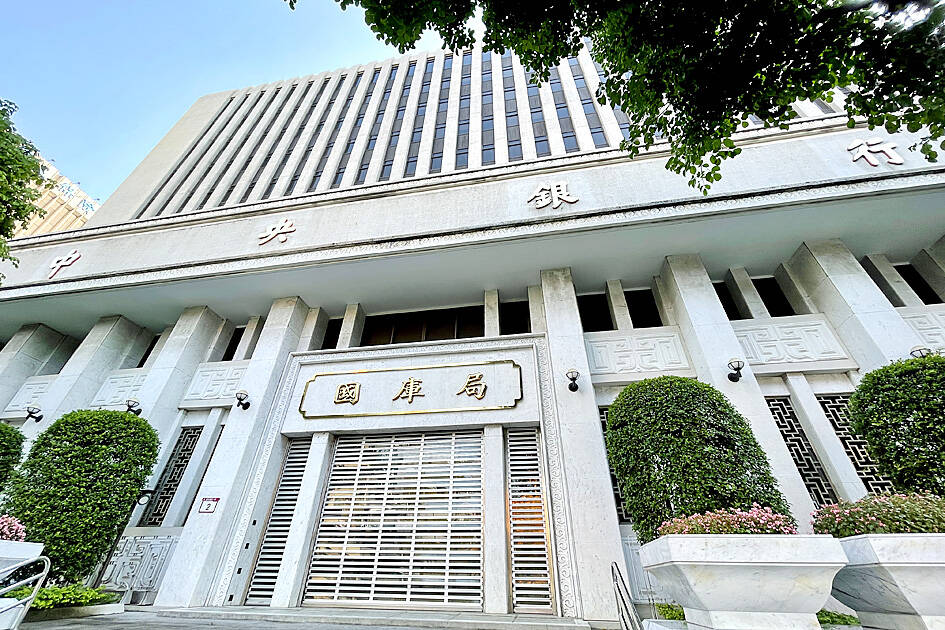The central bank on Friday said that it earlier in the day lifted the interest rate it pays domestic banks for funds held in reserves after raising its policy rates for the third consecutive quarter by 12.5 basis points a week ago.
The interest it pays on reserves originating from passbook deposits on Friday rose to 0.396 percent, while the amount paid on time deposits advanced to 1.083 percent.
That compared with the 0.271 percent interest rate for passbook deposits and the 0.955 percent rate for time deposits before the latest adjustments, central bank data show.

Photo: George Tsorng, Taipei Times
The interest is paid to domestic financial institutions’ B accounts, which account for 55 percent of their reserves, the central bank said, adding that the monetary authority does not pay interest on the remainder of reserves in A accounts.
The move increases costs for the central bank as it pays more to domestic financial institutions that deposit the required reserves.
However, as local lenders increased their deposit rates after the central bank raised its rates on Sept. 23, the monetary authority decided to adjust the interest on its B accounts to reflect the increase in capital costs at local banks, the statement said.
Apart from an increase of 12.5 basis points on its policy rates on Sept. 23, the central bank also on Saturday increased the reserve requirement ratios on New Taiwan dollar demand deposits and time saving deposits by 25 basis points.
While the central bank did not hike rates as aggressively as some economists predicted, its latest actions show that it could tighten fiscal policy throughout the remainder of the year to fight inflationary pressures, analysts said.

PATENTS: MediaTek Inc said it would not comment on ongoing legal cases, but does not expect the legal action by Huawei to affect its business operations Smartphone integrated chips designer MediaTek Inc (聯發科) on Friday said that a lawsuit filed by Chinese smartphone brand Huawei Technologies Co (華為) over alleged patent infringements would have little impact on its operations. In an announcement posted on the Taiwan Stock Exchange, MediaTek said that it would not comment on an ongoing legal case. However, the company said that Huawei’s legal action would have little impact on its operations. MediaTek’s statement came after China-based PRIP Research said on Thursday that Huawei filed a lawsuit with a Chinese district court claiming that MediaTek infringed on its patents. The infringement mentioned in the lawsuit likely involved

Taipei is today suspending work, classes and its US$2.4 trillion stock market as Typhoon Gaemi approaches Taiwan with strong winds and heavy rain. The nation is not conducting securities, currency or fixed income trading, statements from its stock and currency exchanges said. Authorities had yesterday issued a warning that the storm could affect people on land and canceled some ship crossings and domestic flights. Taiwan Semiconductor Manufacturing Co (TSMC, 台積電) expects its local chipmaking fabs to maintain normal production, the company said in an e-mailed statement. The main chipmaker for Apple Inc and Nvidia Corp said it has activated routine typhoon alert

GROWTH: TSMC increased its projected revenue growth for this year to more than 25 percent, citing stronger-than-expected demand for AI devices and smartphones The Taiwan Institute of Economic Research (TIER, 台灣經濟研究院) yesterday raised its forecast for Taiwan’s GDP growth this year from 3.29 percent to 3.85 percent, as exports and private investment recovered faster than it predicted three months ago. The Taipei-based think tank also expects that Taiwan would see a 8.19 percent increase in exports this year, better than the 7.55 percent it projected in April, as US technology giants spent more money on artificial intelligence (AI) infrastructure and development. “There will be more AI servers going forward, but it remains to be seen if the momentum would extend to personal computers, smartphones and

Catastrophic computer outages caused by a software update from one company have once again exposed the dangers of global technological dependence on a handful of players, experts said on Friday. A flawed update sent out by the little-known security firm CrowdStrike Holdings Inc brought airlines, TV stations and myriad other aspects of daily life to a standstill. The outages affected companies or individuals that use CrowdStrike on the Microsoft Inc’s Windows platform. When they applied the update, the incompatible software crashed computers into a frozen state known as the “blue screen of death.” “Today CrowdStrike has become a household name, but not in